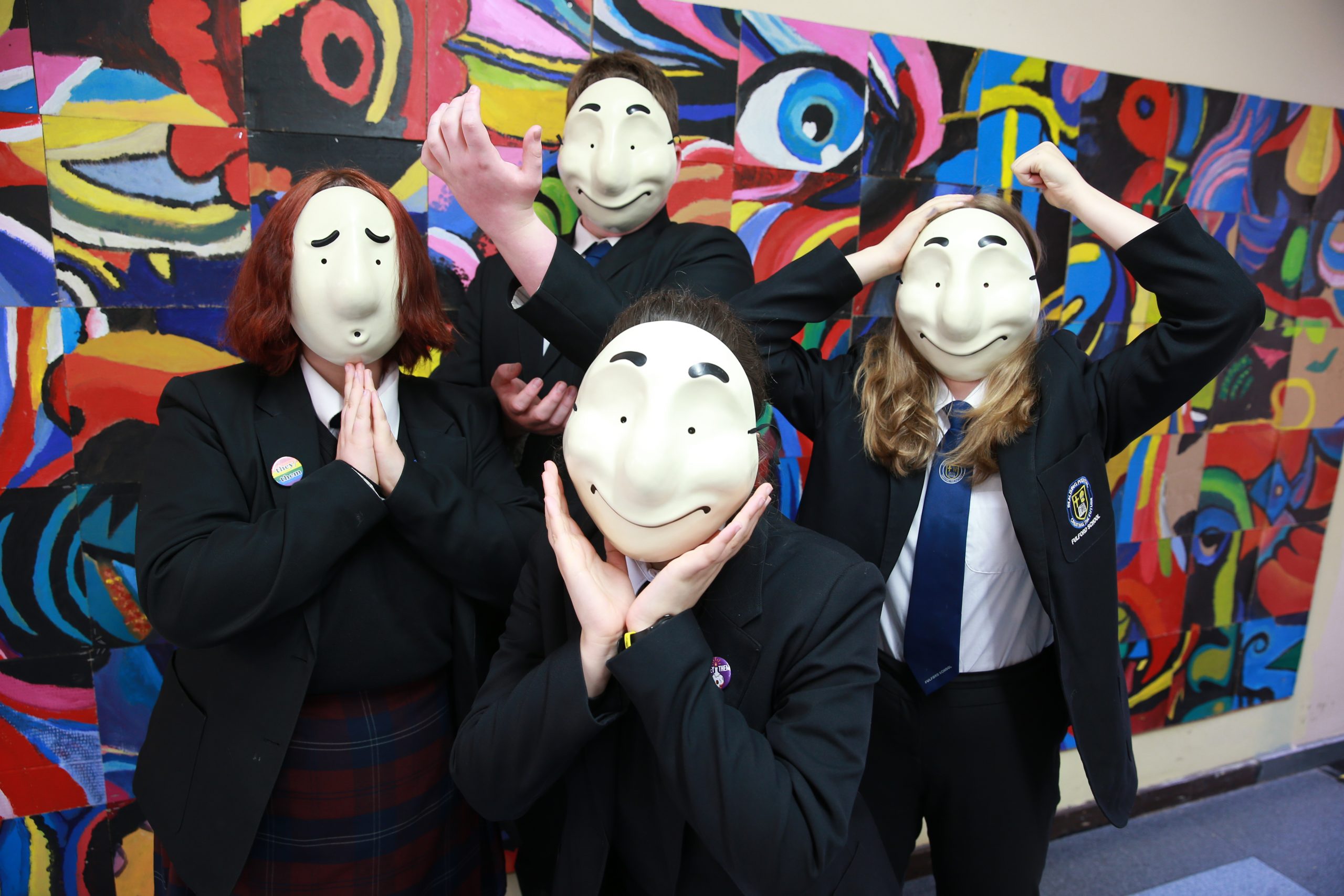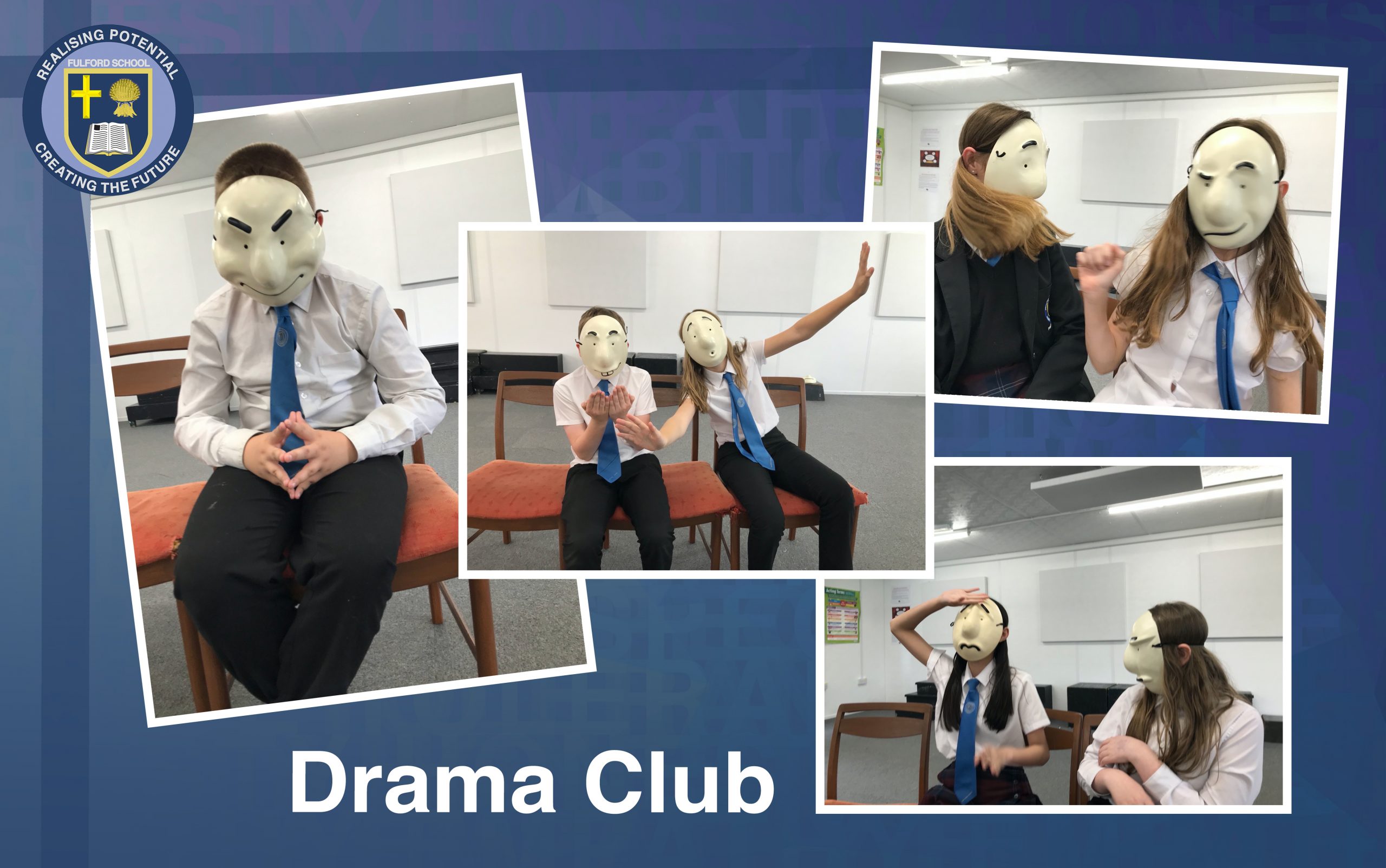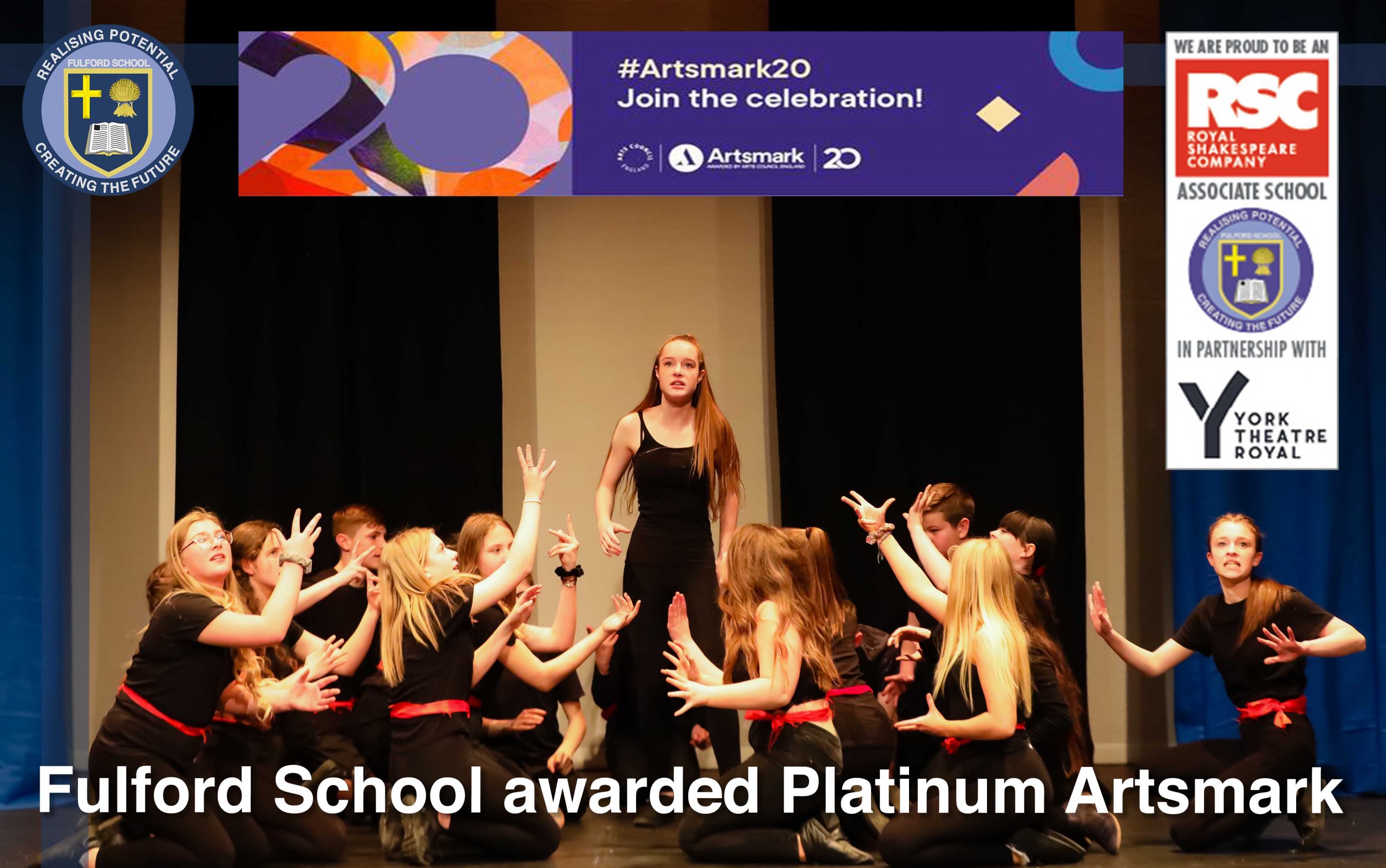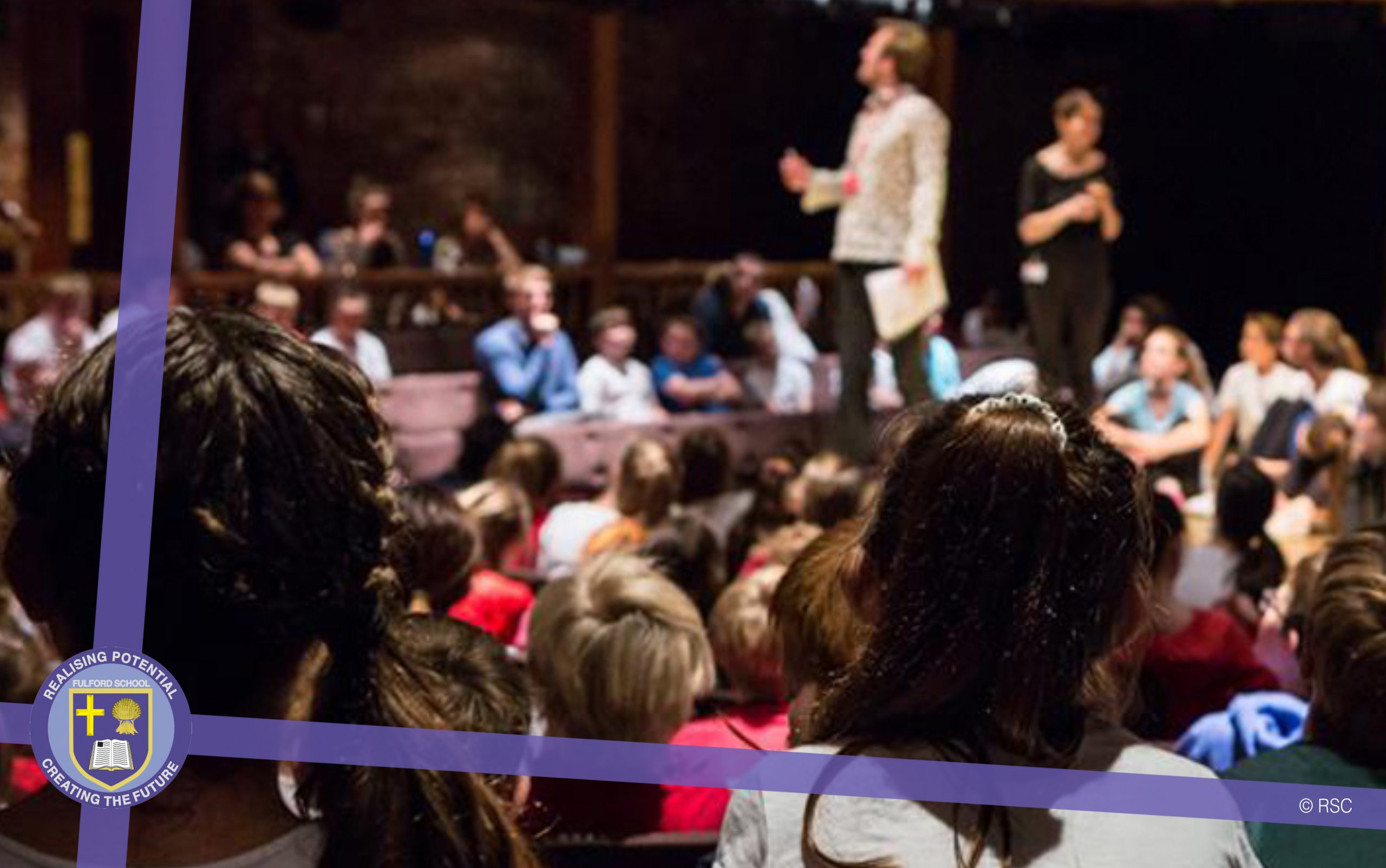Drama
Curriculum Leader: Mrs C. Windrum
We foster a love of Drama and Theatre through engaging lessons, knowledgeable teaching and a rich extra-curricular programme.
- Provide opportunities for students to engage in Drama
- Empower students to strive to produce the highest standards of performance
- Equip students with the knowledge, skills and understanding required to excel in both practical and theoretical areas.
- Develop students’ awareness of how subject links to future employment and the creative industries
- Provide links and opportunities for partnership beyond the school environment

All students at Fulford study drama in weekly, hour-long lessons by a specialist teacher of Drama.
In drama lessons at KS3, students explore a range of drama techniques and styles through improvising and working in role; devising, scripting and performing in plays, and discussing and reviewing their own and others’ performances.
The units studied in each year group are as follows:
Year 7
- Autumn Term
- Introduction to Drama Skills
- Script Work – Refugee Boy
- Spring Term
- The Tempest
- Summer Term
- Style – Trestle Masks
Year 8
- Autumn Term
- Style – Commedia Dell’ Art
- Devising – Titanic
- Spring Term
- RSC Playmaking
- Summer Term
- Script work – Noughts and Crosses
Year 9
- Autumn Term
- Building Devising and Performance Skills
- Live Review – Peter Pan
- Spring Term
- Script work – DNA
- Summer Term
- Developing Devising Skills


During Y10 and 11 students devise drama, explore a set texts practically and work on a text-based performance.
Aiming for success:
The written exam paper is designed to help all students realise their full potential.
It uses a variety of question styles and ask students to combine what they’ve learned about how drama is performed with their practical experience.
Clear progression to A-level:
This specification ensures continuity for students progressing from GCSE Drama to A-level Drama and Theatre studies. Students who go on to A-level are already familiar with studying a whole set text for the written paper. They have built solid foundations in reviewing a live theatre production and in interpreting key extracts.
Transferable skills:
Students learn to collaborate with others, think analytically, problem solve and evaluate effectively- key skills for future, whatever they choose to do. They gain the confidence to pursue their own ideas, reflect and refine their efforts. Whatever the future holds, students of GCSE Drama emerge with a toolkit of transferable skills, applicable both in further studies and in the workplace.
GCSE Drama: Long Term Plan: Year 10
Unit | Focus and Outcome | Weeks |
Autumn 1/2 | ||
Topic TBC
| Focus: Devising, Research and Development Outcome: Polished devised performance to film Devising log Resources: Devising log book | 14 |
Spring 1/2 | ||
Component 1: Section C | Focus: Analysis and review Outcome: Exam response Resources: Digital theatre – “Billy Elliot” Or production seen Year 10 Reports | On-going |
Component 1: Section B | Focus: Set text practical and design exploration Outcome: Exam questions Performance of set text as a mock performance Resources: Copies of “Blood Brothers” “Blood Brothers” workbook Assessed in Y 10 Exams | 14 |
Summer 1/2 | ||
Y10 Exams | ||
Component 1: Section B | Focus: Set text practical and design exploration Outcome: Exam questions Performance of set text as a mock performance Resources: Copies of “Blood Brothers” “Blood Brothers” workbook
| |
GCSE Drama: Long Term Plan: Year 11
| Unit | Focus and Outcome | Weeks |
| Autumn 1/2 | ||
Component 3 – Text in Practice
| Focus: Scripted performance Outcome: Scripted performance for assessment Visiting examiner Resources: Student’s choice NOT Blood Brothers Examined by AQA Jan-March | 14 |
| Preparation for Mock – November | ||
| Spring 1/Spring 2 REVISION Exam mid May | ||
Component 1: Section A
| Focus: Skills for multi-choice Outcome: Exam style Questions Resources: Exam Sheets | 14 |
Component 1: Section B
| Focus: Set Text Outcome: Exam style Questions Resources: Blood Brothers | |
Component 1: Section C
| Focus: Analysis and review Outcome: Exam response Resources: Digital theatre Final Exam May | |
| Link to Specification | ||
AQA Drama and Theatre Studies Specification
We want students to have an inspiring experience of A-level Drama and Theatre; this qualification emphasises practical creativity alongside research and theoretical understanding.
Students learn through experience, seeing theatre and making theatre for themselves. Students are introduced to a wide range of theatrical styles and contexts as they explore plays practically, devise and work on performances.
Students choose to develop as a:
- performer
- designer (lighting, sound, set, costume, puppets)
- director
- combination of these.
Whichever option they choose, students will gain many invaluable skills, both theatrical and transferable, to expand their horizons.
The exam paper is designed to allow students to demonstrate their creativity and imagination in interpreting set texts and apply independent thinking as they evaluate a live theatre production.
Clear progression to higher education:
Higher education institutions (HEIs) value and respect the skills AQA drama and theatre qualifications give students.
By incorporating the approach they take with drama and theatre undergraduates into this A-level, students are really well prepared for the demands of university and beyond.
Transferable skills:
Students of AQA Drama and Theatre develop skills that are not just essential for drama but applicable to a wide range of higher education subjects and in the workplace. This specification refines students’ collaborative skills, their analytical thinking and their approach to research. Students grow in confidence and maturity as they successfully realise their own ideas. They learn to evaluate objectively and develop a sound appreciation of the influences that cultural and social contexts can have on decision making.
Whatever the future holds, students of A-level Drama and Theatre emerge with a toolkit of transferable skills preparing them for their next steps.

A level Theatre Studies: Long Term Plan – Year 1
Autumn 1/2
Component 1: Drama and Theatre A Servant of Two Masters | Introduction and investigation of the text through practical exploration, discussion, design and written tasks. • Section A: one question (from a choice) on one of the set plays from List A (25 marks). | Live review on going Try to find performances related to practitioners |
Practitioners In preparation for Component 2: Creating Original Drama and possibly Component 3: Making Theatre
| Component 2 Students will be introduced to a range of Drama Practitioners in preparation for creating an original piece of devised theatre, influenced by a specific Drama Practitioner. This should be evident in all aspects of the rehearsal, and performance of the piece.
Component 3 Students will practically explore (workshop) and interpret three key extracts (Extract 1, Extract 2 and Extract 3) each from a different play and complete two assessment tasks |
Spring 1/2
Practitioners In preparation for Component 2: Creating Original Drama and possibly Component 3: Making Theatre
| Live review on going Try to find performances related to practitioners |
Summer 1
Select practitioner for Component 2: Creating Original Drama
| Students will be introduced to a range of Drama Practitioners and create an original piece of devised theatre, influenced by a specific Drama Practitioner. This should be evident in all aspects of the rehearsal, and performance of the piece. The stimulus/stimuli for the devised piece must be chosen by students and there are no restrictions. This could be: • from literature or art • an adaptation of a poem, a folk tale, a newspaper story • theme-based or focused on an historical event • wholly original • intended to educate the audience, to express a political viewpoint, to be serious or comical.
The process will be recorded in a working notebook. The Working Notebook is worth twice the marks of the final recorded performance. 4-6 minutes per performer | Live review on going Try to find performances related to practitioners |
Summer 2
Complete Component 2: Creating Original Drama
|
| Live review on going Try to find performances related to practitioners |
Component 1: Drama and Theatre Section B – 20/21st Century drama The Glass Menagerie
| Introduction and investigation of the text including work on theatrical context, and practical workshops exploring the text in action. Students complete practise questions. •Section B: one three part question on a given extract from one of the set plays from List B (30 marks).
|
***************************************************************
A Level Theatre Studies –Long Term Plan Year 2
Autumn 1/2
Component 3: Making Theatre 3: Key Extracts Extract 2 Extract 3
Decide which extract to complete and which practitioner applied Must be a different practitioner to that used in Devising piece,
Prepare performance
| Students will practically explore (workshop) and interpret three key extracts (Extract 1, Extract 2 and Extract 3) each from a different play and complete two assessment tasks: • Present Extract 3 to an audience. (Externally moderated) • Produce an individual Reflective report analysing and evaluating their theatrical interpretation of all three key extracts studied.
Extract 1, Extract 2 and Extract 3 must be understood in the context of the whole play.
For the performance of Extract 3 students must apply the work and methodologies of one of the prescribed theatre practitioners.
| Live review on going Try to find performances related to practitioners |
Component 1: Drama and Theatre Section B – 20/21st Century drama “The Glass Menagerie”
| Introduction and investigation of the text including work on theatrical context, and practical workshops exploring the text in action. Students complete practise questions. •Section B: one three part question on a given extract from one of the set plays from List B (30 marks).
|
Spring 1
Complete Component 3: Making Theatre 3: Key Extracts
Complete Reflective Reports
| Produce an individual Reflective report analysing and evaluating their theatrical interpretation of all three key extracts studied. Reflective report will have been started in Y12 |
Spring 2/ Summer 1
Revision: A servant of Two Masters The Glass Menagerie Live Review – |
Specification:
https://www.aqa.org.uk/subjects/drama/a-level/drama-7262/specification
There are lots of opportunities to get involved in extra-curricular Drama activities at Fulford. As well as regular theatre trips and a Year 7 and 8 Drama club, we stage a whole school production every year. Recent productions include Charlie and the Chocolate Factory (2025), Oliver! (2024), Disney’s Beauty and the Beast (2023), The Wizard of Oz (2022), Peter Pan (2020), Good Night Mr Tom (2019), We Will Rock You (2018), Lady Windermere’s Fan (2017), Romeo and Juliet (2016), Grease (2014), Joseph (2012), Bugsy (2011) and Little Shop of Horrors (2010).
Lower School Drama club runs every Wednesday 3.30-4.15 offering students the opportunity to explore further ideas through drama. The Drama department runs termly showcases to celebrate the work of students in lessons
There is an opportunity for Y9 students to be involved in a Living History project in the Summer term, performing at York Cemetery.
Students at KS4 and 5 are expected to attend the theatre as part of the course, and there are opportunities to take on a role in delivering extra-curricular sessions, supporting in lessons, back-stage, lighting and assistant directing for willing KS5 students.
We have links with local theatres, universities, professional individuals and companies working in the performance industry. We use these links to provide a varied and effective enrichment programme to support the work done within the curriculum in Drama.




- Mrs C Windrum
- Ms L Cole
- Miss J Fergie
- Miss A Greene
